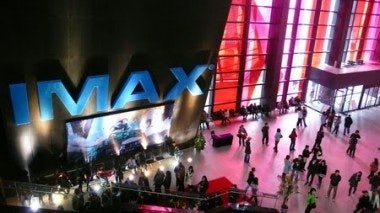Box-Office Receipts In China Jumped Tenfold Last Year To 286 Million Yuan (US$43.6 million)#

IMAX will triple its presence in China over the next three years (Image: AP)
This week, IMAX CEO Richard Gelfond announced that his company plans to triple its presence in mainland China over the next three years, building 75 super-sized screens in partnership with Wanda Cinemas in a deal said to be worth nearly $100 million. The announcement comes shortly after the Chinese government called the development of China's cultural industries a "pillar" of its 12th five-year plan, and follows the news last week that Beijing plans to build a record-breaking 130,000 square meter extension to the National Art Museum of China. According to Wang Jianlin, CEO of the Dalian Wanda Group -- developers of everything from commercial properties and luxury hotels to film screens -- his company's agreement with IMAX, by further developing the Chinese cinema industry, "will help China achieve its 12th five-year plan.”
While IMAX CEO Gelfond and Wanda CEO Wang are predictably bullish about their partnership -- the agreement was, according to the Hollywood Reporter, inked in "the gilt ballroom of a Wanda-owned luxury hotel to the sound of blasted snippets of the Star Wars theme -- it comes as the United States applies greater pressure on China to loosen its tight restrictions on foreign media imports in accordance with its WTO obligations. Currently, China limits the number of foreign films it will allow into the country each year to around 20, despite its agreement in 2001 to increase the annual theatrical quota to 50 by 2005. This has been a constant source of friction between China and the United States, as Hollywood hopes to have more of its films seen more by paying Chinese audiences rather than on bootleg DVDs.
This isn't surprising, as Hollywood films have traditionally been among the most successful in Chinese cinemas, with Avatar grossing over $200 million there last year. The popularity of foreign films and competitive advantage they have at the box office has regularly been cited as the motive for Beijing's stalling on the greater liberalization of the Chinese film industry. As director Jia Zhang-ke told Jing Daily last year, domestic Chinese filmmakers simply find it difficult to compete with big-budget imports, because
movie tickets are really expensive in China. For premier films, tickets cost at least 50 RMB (US$7.61) and can go as high as 120 RMB (US$18) – that’s almost as expensive as they are in the U.S., or maybe even more. Going to see a movie has become a really expensive activity. So when people decide to go to the theater, they want to get their money’s worth and tend to choose the imported Hollywood blockbuster over anything else.
So going back to IMAX and its huge China rollout plan, the question remains: will they have enough films to show? While the number of Chinese-made IMAX films, and their box-office success, is steadily growing, with Feng Xiaogang's Aftershock grossing about $100 million last year, the question remains whether China's foreign film quota and relatively limited IMAX production capacity will be able to supply the country's new mega-theaters with a steady stream of new films. Though the IMAX website lists around 12 Hollywood films slated for IMAX release over the course of 2011, whether most, or all, of these will be shown in China will remain to be seen. (Though some, like Kung Fu Panda 2, will almost certainly make it across the Pacific.)
At the moment, the consensus seems to be that IMAX has good reason to be cautiously optimistic about its prospects in the China market, as its partnership with a high-profile, well-placed company like the Wanda Group will certainly grease the wheels of Chinese bureaucracy, and as the New York Times points out, China has a strong record of approving Hollywood films that IMAX wants to show. But if they can only show around 20 per year, maximum, it doesn't bode well for the Chinese consumer, who will have to spend anywhere from 80-120 yuan (US$12-18) -- no small sum for many there -- to see critically panned but big-budgeted films like I Am Number Four.